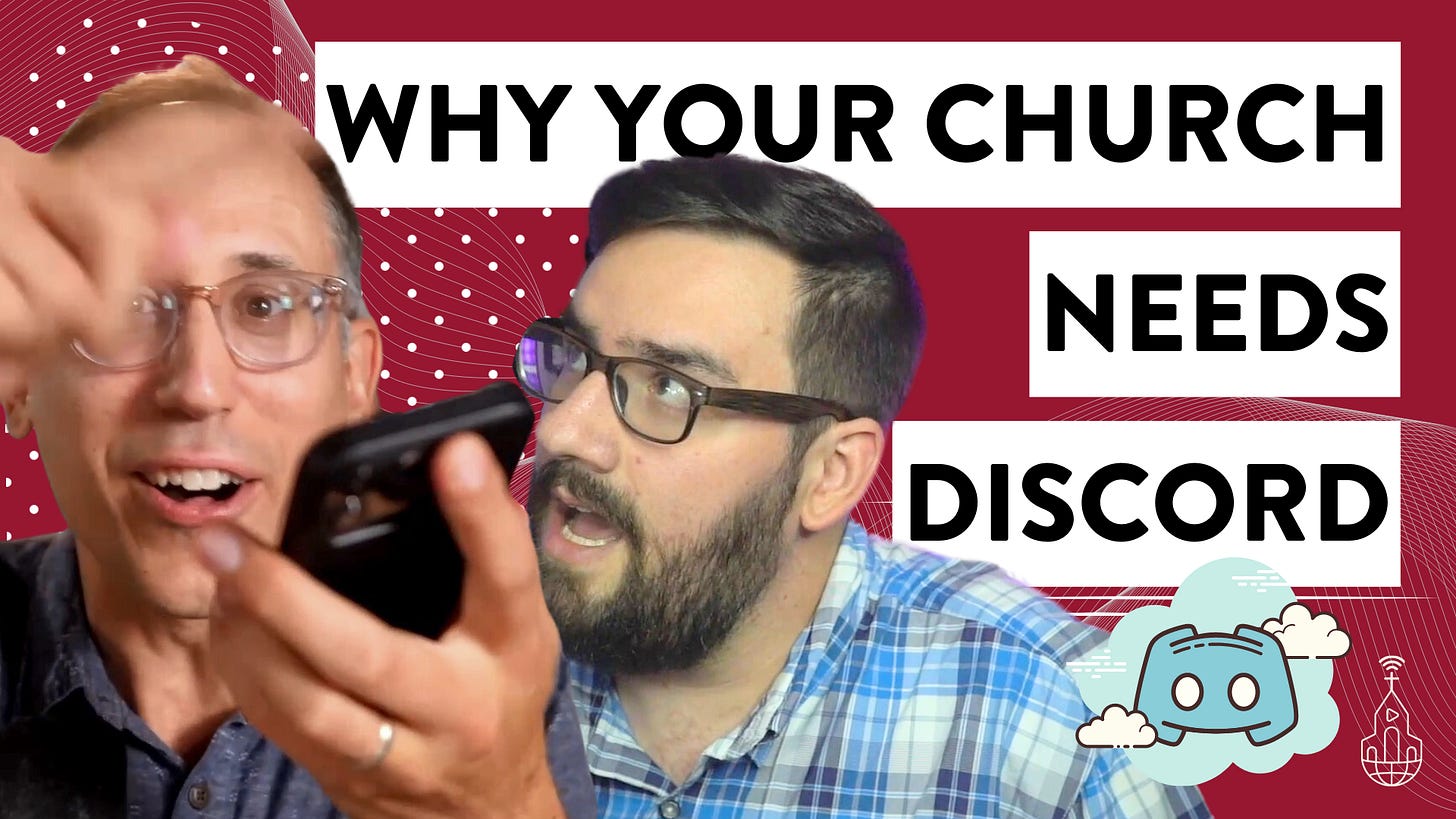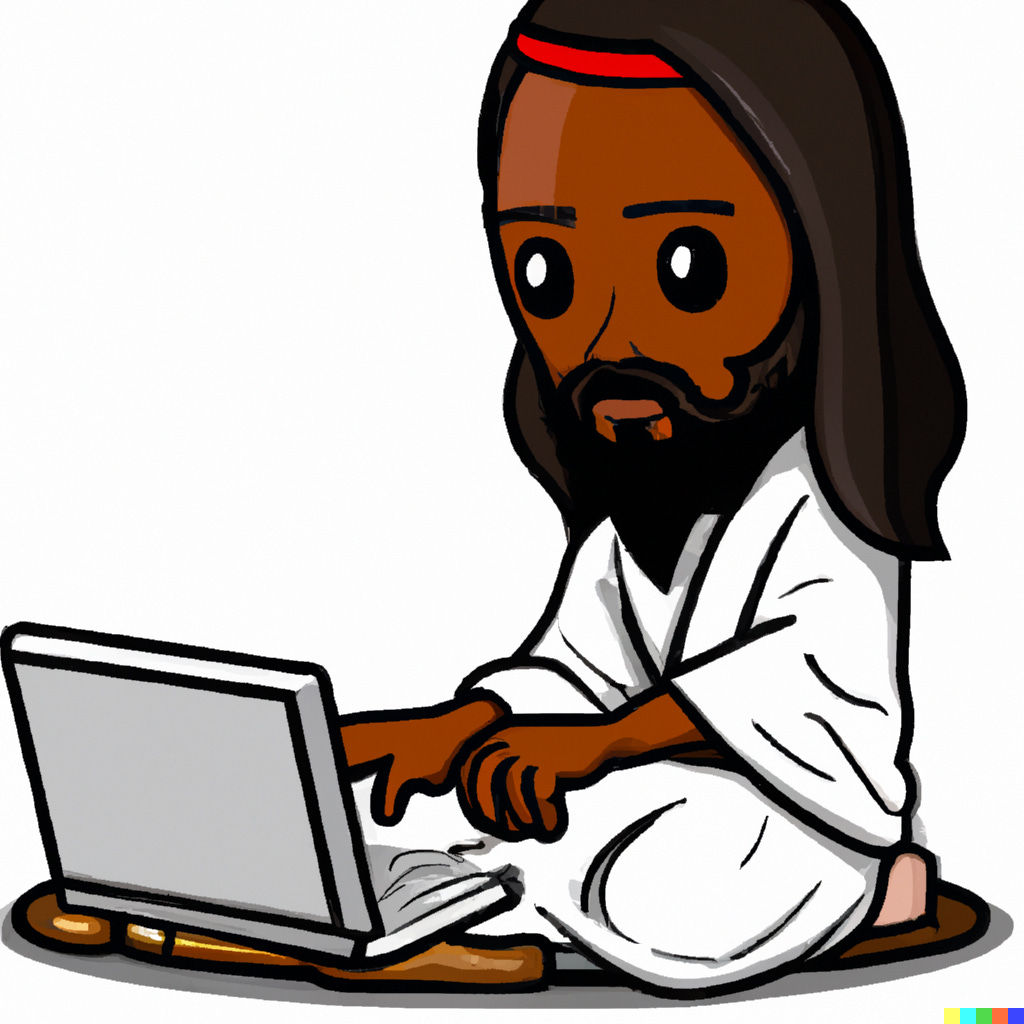What Is Discord and Why Should Your Church Use It?
And one way that I'm planning to try it at The Riverside Church
Over three years ago we were all thrown (pushed?) into the deep end of what seem to be ever changing digital waters. We found some good lifeboats with Zoom and likely still use it for various meetings and gatherings still today. We opened iMovie and discovered that your phone is a pretty powerful tool for ministry. We dabbled in different ways to livestream a gathering, making online and hybrid options a possibility. We learned how to tell a sixty second sermon on TikTok. We discovered the possibility for pastoral care through WhatsApp and other messaging platforms. In short, we have all become digital ministers.
And then there’s Discord.
What was first launched as a way for gamers to chat with one another has evolved into a way to cultivate and create your own community online. Over the past few years I have continued to see Discord popping up again and again, specifically in digital ministry spaces. From Rev. Bethany’s “Our Tapestry” ministry to Nerd Pastor Nate and Checkpoint Church, this platform offers a unique opportunity for people to connect with one another from anywhere and at any time. Rev. Bethany often says that unlike a traditional church, her Discord space is open 24/7. You can always find someone to connect with or something to reflect on.
But before we get any further, what exactly is Discord?
To keep this explanation nice and succinct, let’s have Chat GPT answer that one:
Discord is a communication platform designed for creating communities and fostering interactions among users through voice, video, and text. It's commonly used by gamers, but it has also gained popularity in various other interest groups and communities beyond gaming.
Discord allows users to create or join "servers," which are essentially virtual spaces where people can gather to discuss topics, share media, and engage in conversations. Within servers, users can participate in text-based discussions through channels and also engage in voice and video chats. Servers can be public or private, depending on the intended level of access and interaction.
To learn more about Discord and how it can be used for ministry, check out the latest video in my “How To Do Digital Ministry” series. I might be a bit biased, but it’s a good one.
But is Discord something just for “nerds, geeks, and gamers” like Checkpoint Church? Is it just for those “online only/mostly” ministries like Rev. Bethany’s? No! Even for those of us in old fashioned brick and mortar churches or balancing a hybrid reality, this platform has incredible possibility for us as well.
Let’s talk about how I hope to try Discord with the online congregation at The Riverside Church.
On a Sunday morning at Riverside, most of our congregants are not in the room. And yes, you read that correctly. Most of our congregants are not in the room. Ever since we resumed gathering in person for Sunday morning worship (Fall 2021 with another online-only hiatus that Dec-Feb) we have had 60% of our Sunday morning congregation joining us online, leaving a consistent minority of our congregation to be sitting in the pews in the building. We have all sorts of intentional ways to integrate these two worshipping communities (more on that in another email and video) and many of our online congregants are active and engaged in the live chat on YouTube (which is the only place we broadcast the livestream).
While not every online congregant, a consistent and significant group can be seen greeting one another, shouting (er, typing) “Amen” or “That’ll preach,” passing the peace, responding to questions, and more. But what if instead of leaving this conversation to the ephemeral space of YouTube live chat, we invited people to join a Discord server where they could have these Sunday morning conversations. This would allow everyone worshiping to participate and not just those who are watching directly on YouTube (many watch the embedded video on our website or through our app, making the YouTube live chat feature much less easy to utilize). Or imagine sitting in a pew on Sunday morning and participating in a realtime conversation with congregants from around the world. That would take “turn and say hi to your neighbor” to a whole other level!
And perhaps what I like most about this idea is that both the conversation and the possibility for connection remain long after the worship service ends. If I want to reach out directly to someone who asked a specific question or made a comment, I can contact them directly. If I want to revisit what someone shared during the service, it’s all right there.
Now I know there are plenty of hurdles in this experiment I hope to employ — getting people to create an account, download the app, actually use the thing, etc. — but the possibilities for how it could connect congregants and cultivate community seem worth it to me. But who knows. Ask me about it six months and I’ll let you know where we’re at.
What about you? Do you use Discord for your ministry? Or do you have ideas for how you could? Leave a comment below or send me an email (or maybe we should start a Discord server?!). I’d love to hear from you and am always eager to hear what you are up to in the world of digital ministry.
Oh, and in the latest video on my YouTube channel (you’re all subscribed to that, right?) we dive into a whole lot more than just Discord:
Hey, did you know that my “How To Do Digital Ministry” show is available as a podcast? Just search for it wherever you listen to podcasts and start listening! (Look, here’s Jesus searching for it now. Enjoy!)



Thanks for sharing the idea of using Discord. Yes, lets get a server started so we can link to that and start trying this option.
Anne from Hillsdale UCC, Portland OR.
I think this is an intriguing idea Jim. We do a fully hybrid Ecumenical Catholic liturgy using Zoom, complete with lectors sharing roles, prayer of the faithful including Zoom members, and a shared homily.
We actually have asked people not to use the chat. The reason is that it's kind of like passing notes in class and it's a mechanism for not being 100% present. Now of course everybody has a zillion other ways to not be 100% present , right? Anyway, I am now finding myself wondering about discord for other ways of connecting. I need to think more about this but thanks for planting the seed!